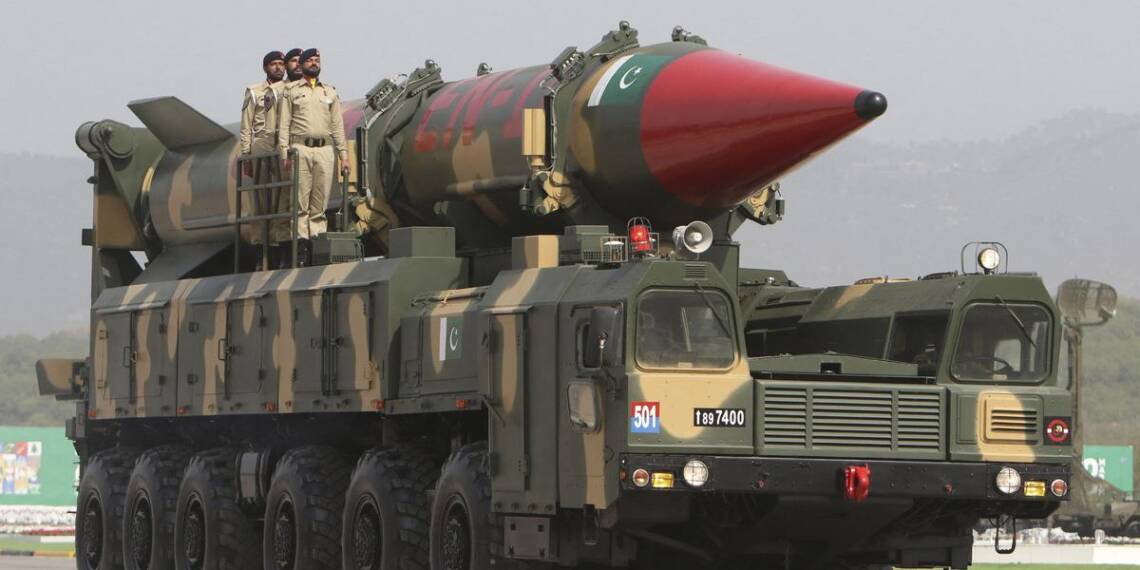A senior White House official has described Pakistan as an “emerging threat” to the United States due to its development of long-range ballistic missiles capable of reaching targets as far as the United States. Washington has taken a significant step to curb the expansion of Pakistan’s ballistic missile capabilities by imposing sanctions on four organizations involved in the development and proliferation of weapons of mass destruction (WMD). The move is seen as part of a broader effort to address concerns over the growing threat posed by Pakistan’s missile programs, particularly its long-range missile developments.
Speaking at a Carnegie Endowment for International Peace event on 19 December, the US Deputy National Security Adviser Jon Finer said that Pakistan has developed “increasingly sophisticated missile technology, from long-range ballistic missile systems to equipment, that would enable the testing of significantly larger rocket motors.”
If those trends continue, Finer said, “Pakistan will have the capability to strike targets well beyond South Asia, including in the United States, raising real questions about Pakistan’s intensions.” The number of nuclear-armed states with missiles that can reach the US homeland “is very small and they tend to be adversarial”, Finer said, naming Russia, North Korea and China.
“So, candidly, it’s hard for us to see Pakistan’s actions as anything other than an emerging threat to the United States,” Finer said.
Sanctions on Pakistan
The entities targeted by the US sanctions are the National Development Complex (NDC), Akhtar & Sons Private Limited, Affiliates International, and Rockside Enterprise. These organizations are accused of contributing to Pakistan’s ballistic missile program, which is said to be aimed at enhancing the country’s capability to deliver weapons of mass destruction. The sanctions are part of the US’s ongoing efforts to prevent the proliferation of such weapons, particularly in relation to countries like Pakistan, China, and Belarus.
Matthew Miller, a spokesperson for the US State Department, made it clear that the sanctions were not imposed without cause. “America has been continuously expressing concerns about the proliferation of weapons of mass destruction. The organizations that have been banned are engaged in activities that contribute to the development of ballistic missiles capable of delivering these weapons,” he stated. The US has stressed that its actions aim to prevent the proliferation of nuclear and missile technologies.
The National Development Complex (NDC), based in Islamabad, is considered a central player in Pakistan’s missile development program. According to the US State Department, the NDC has been instrumental in the development of Pakistan’s Shaheen-series ballistic missiles, which are designed to carry nuclear payloads over long distances.
In addition to NDC, the US has sanctioned three companies that have provided crucial support to Pakistan’s missile program. Akhtar & Sons Private Limited, a Karachi-based company, has been involved in supplying equipment for Pakistan’s long-range missile development. Similarly, Affiliates International and Rockside Enterprise have played key roles in providing materials and components necessary for missile technology. These entities were linked to the NDC’s missile development efforts, thus amplifying concerns over the proliferation of advanced missile technology.
The US sanctions are part of a broader strategy which specifically targets entities involved in the proliferation of weapons of mass destruction and their delivery systems. The US Department of State has underscored that these sanctions are aimed at preventing the spread of missile technology that could potentially enhance Pakistan’s ability to deliver nuclear warheads, thus posing a serious security threat to the region.
The ongoing concern about the proliferation of Pakistan’s missile technology has drawn global attention, especially given the strategic implications for regional security in South Asia. The US has reiterated its commitment to addressing the risks posed by the spread of WMDs, as well as to holding accountable those entities that contribute to such proliferation.
Pakistan is always in the news for the vast array of terrorist outfits operating within its borders. The country is going through massive instability with its former PM behind bars. Pakistan has an extensive missile program and its capabilities can fall in the wrong hands at any time. Worryingly for the world, the country possesses long range missiles that are nuclear capable. The United States which has previously considered the Pakistan regime as an ally is now concerned that Pakistan’s military capabilities can be used against the US in the future.







